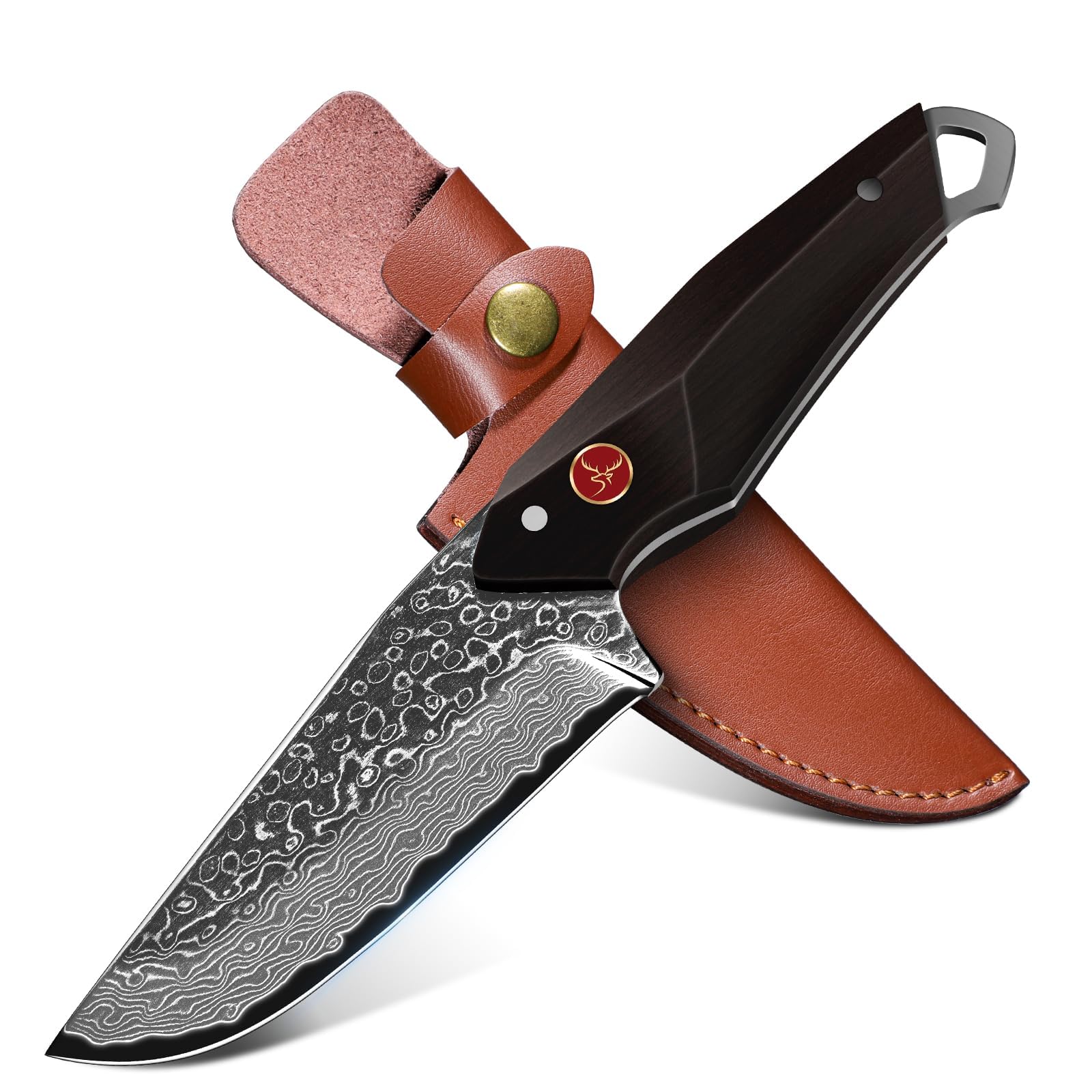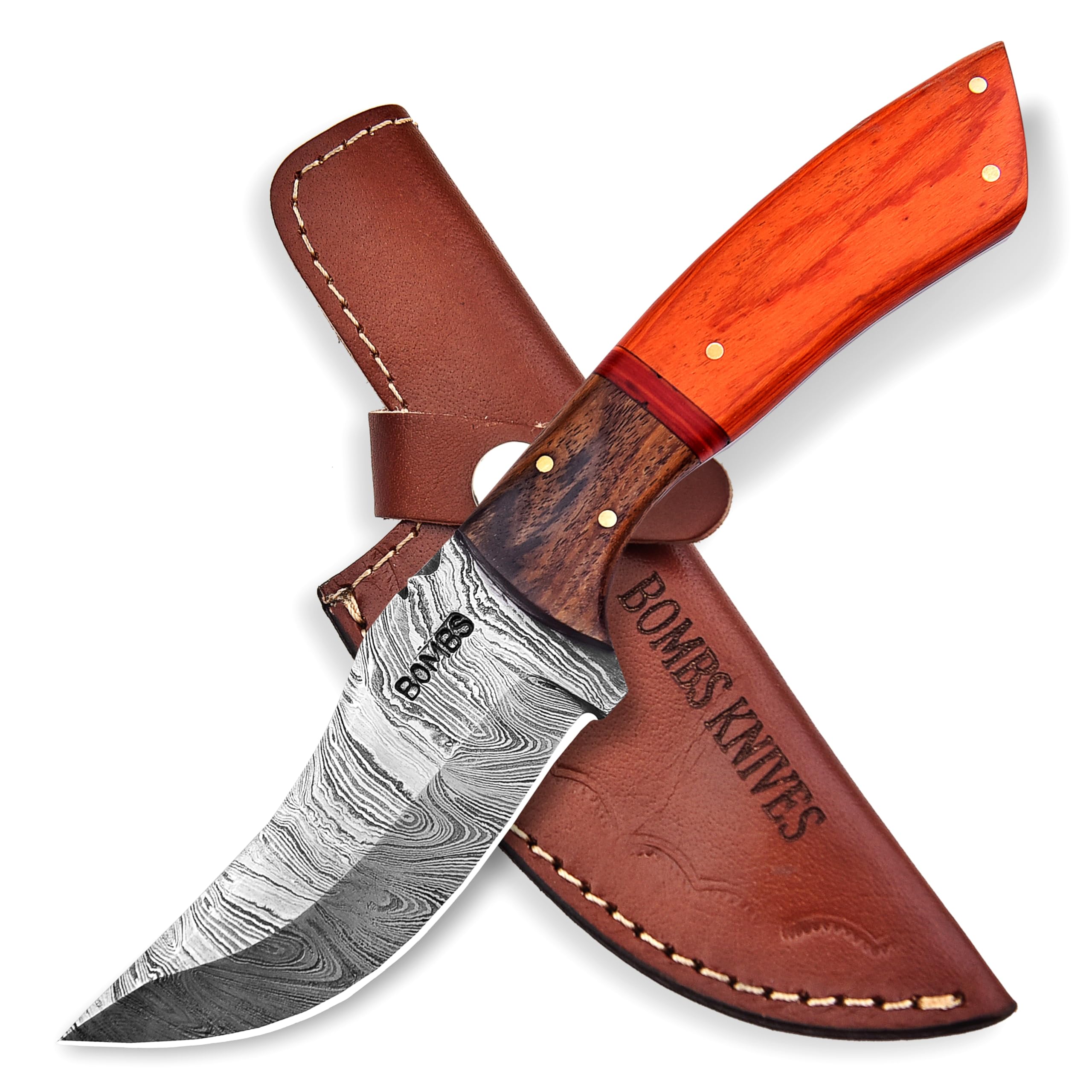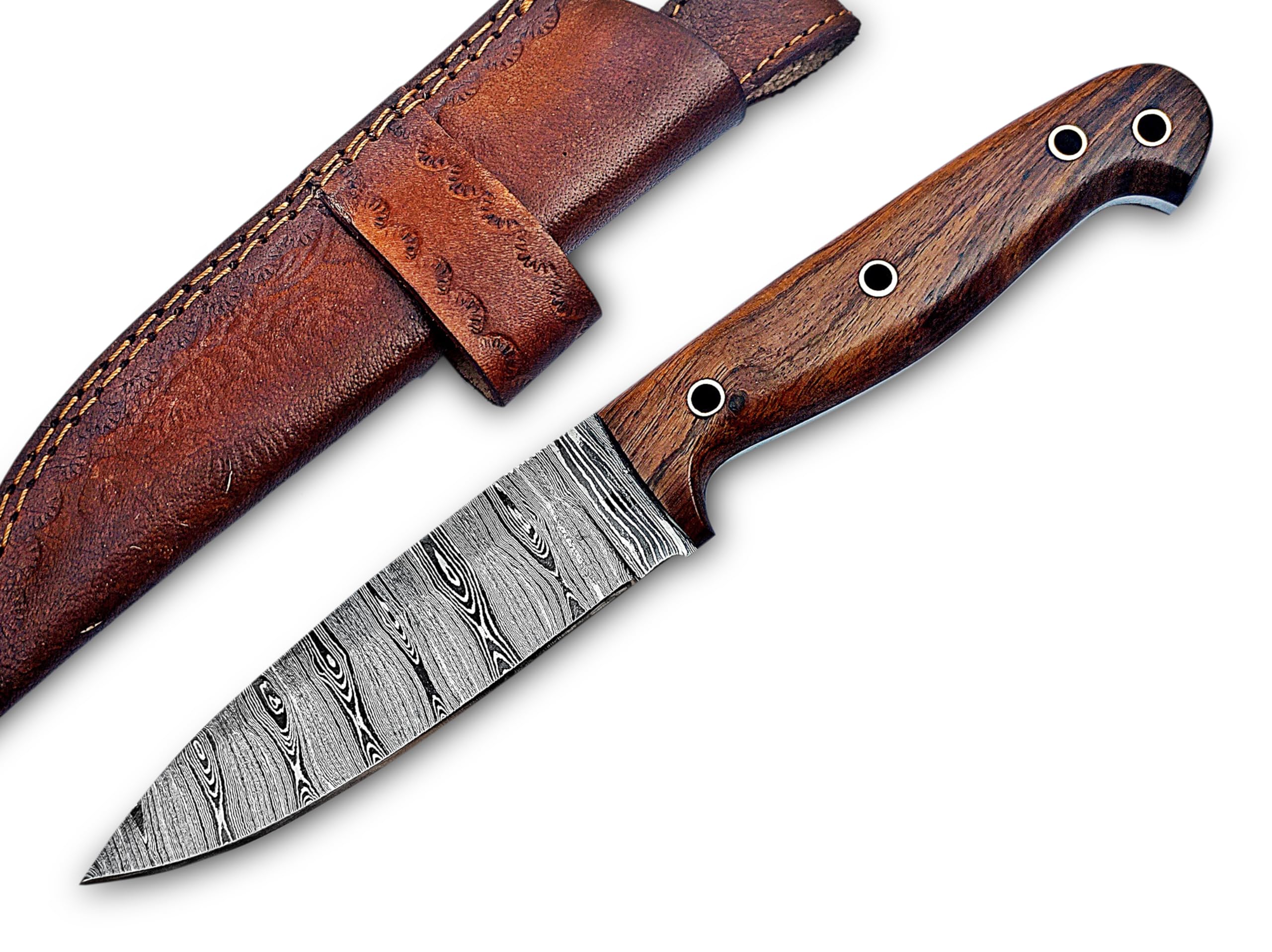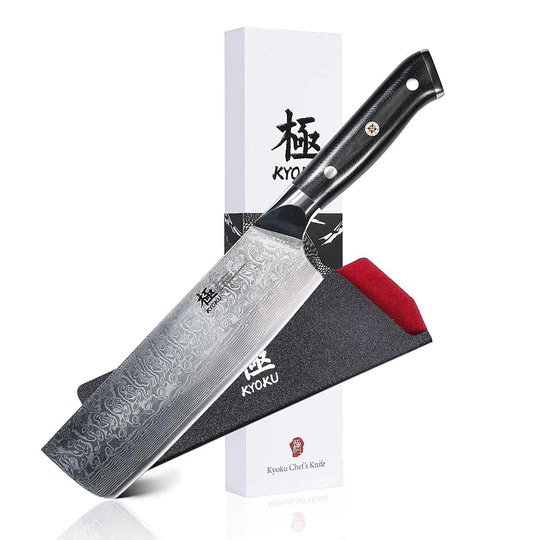


Damascus knives are essential if you hunt, fish, or spend time in the wilderness. These knives help you to field dress game, prepare food, and handle various cutting tasks.
Damascus steel gets its name from the distinctive wavy patterns and sharp cutting performance. This guide will help you choose the right Damascus hunting knife for your next adventure.
When choosing a Damascus hunting knife, beginners should focus on steel quality, blade length, and handle comfort.
Modern Damascus knives are made by folding and welding different types of steel together. This process creates layers that form beautiful designs and produce a strong, sharp blade that holds its edge well.
Look for high-carbon steel that holds a sharp edge well and shows clear patterns in the metal.
Look for a knife handle that feels secure, and won’t slip when wet. The handle size should match your hand size. The knife will be hard to control if its too big or too small.
Common handle materials include wood, bone, and synthetic options.

Different blade shapes work better for different tasks. Drop point blades work well for most hunting jobs. Skinning blades have curved edges for removing hide.
Pick a blade length based on what animals you hunt. Smaller blades work for birds and fish. Larger blades handle big game better.
We tested dozens of Damascus knives to find the best options for new hunters. Our top picks balance quality, durability, and ease of use at prices that won’t break the bank.

We recommend this knife for beginners who want an affordable entry point into Damascus steel hunting knives, though the pattern might be etched rather than forged.
Pros
Cons
We picked up this Tan Ren hunting knife for a recent camping trip and found it surprisingly capable for its compact size. The blade arrived sharp enough to slice through paracord on the first try.
The wooden handle feels solid in our grip without any wobble or loose parts. During food prep at camp, we could work for twenty minutes without our hand getting tired. The curves fit naturally against our palm.
This knife works well for basic outdoor tasks like cutting kindling or preparing fish. We used it to trim small branches and open packages with good results. The leather sheath clips onto our belt securely and releases the knife smoothly when needed.
The Damascus pattern looks attractive but doesn’t appear to be traditional forge-welded steel. One user mentioned it looks laser-etched, which matches what we observed under close inspection.

This Damascus steel hunting knife offers solid build quality and attractive patterns at a budget-friendly price, making it a good starting point for new hunters.
Pros
Cons
We found this Viking Hunter knife strikes a nice balance between looks and performance. The Damascus steel blade arrived impressively sharp and ready for field work. After using it for basic skinning tasks, we noticed the 4.5-inch blade length handles most hunting jobs well.
The rosewood handle feels solid in our hands. We appreciate how the ergonomic design reduces fatigue during longer cutting sessions. The full tang construction gives us confidence this knife won’t fail when we need it most.
We did notice the leather sheath requires specific positioning to work properly. The knife stays secure when carried handle-up, but tilting it down causes problems. The genuine leather construction and reinforced stitching impressed us.
The Damascus pattern varies between knives, which we actually like since each one looks unique. We tested the edge retention and found it holds up reasonably well for the price point. Some light maintenance keeps it performing at its best.

This handcrafted Damascus knife offers solid performance for beginners who want beautiful steel patterns at a budget price.
Pros
Cons
We found this Damascus knife delivers good cutting power right out of the box. The 4.5-inch blade holds an edge well and handles skinning tasks without much effort. The steel feels solid in our hands.
The rosewood handle provides a secure grip even when wet. We appreciate how the natural wood grain looks against the Damascus steel patterns. The ergonomic shape reduces hand fatigue during longer cutting sessions.
Our biggest concern involves quality control issues. We received one knife with rust spots that required cleaning before first use. The blade also arrived duller than expected for a knife marketed as razor sharp.
The included leather sheath impressed us with its thick construction. It holds the knife securely and the belt loop makes carrying easy. However, the sheath runs larger than needed and adds bulk to your gear.
For beginners wanting their first Damascus knife, this Sogo model offers decent value. Just inspect it carefully when it arrives and be prepared to do some initial sharpening.

This handmade Damascus hunting knife delivers solid performance for beginners who want quality construction without breaking the bank.
Pros
Cons
We found this knife performs well right out of the box. The Damascus steel blade came razor sharp and made clean cuts through both meat and hide during our hunting trips. The 4-inch blade length hits the sweet spot for most hunting tasks.
The full tang design stands out during heavy use. We appreciated how balanced the knife feels in hand, even when applying pressure for skinning work. The engineered wood handle provides a secure grip, though some may find the bright orange color a bit bold for their taste.
Weight becomes noticeable after extended periods of detailed work. At over 12 ounces, this knife is heavier than many similar models. The included leather sheath holds the blade securely and slides easily onto a belt.
Build quality impressed us overall. The handmade construction shows attention to detail, and the Damascus pattern looks attractive. For beginners wanting their first serious hunting knife, this offers good value and reliable performance in the field.

This handmade Damascus steel knife works well for beginners who want quality craftsmanship at a fair price, though the loose sheath needs improvement.
Pros
Cons
We tested this knife in the field and found the 4.5-inch Damascus blade cuts through hide and meat with ease. The steel feels solid and stays sharp during skinning tasks. The clip point design gives good control for detail work.
The sky blue wooden handle provides a comfortable grip, even during long skinning sessions. Our hands didn’t get tired or slip. The full tang construction makes the knife feel balanced and sturdy.
The included leather sheath holds the knife too loosely, which could be unsafe when moving around. The blade started showing rust spots after a few uses, so keeping it dry is important.
The handmade nature means each knife looks a bit different from the photos. Some buyers might receive colors that don’t match their expectations.

This budget-friendly Damascus knife offers solid performance for new hunters who want the look of premium steel without the high price tag.
Pros
Cons
This knife delivers decent cutting performance right out of the box. The 4-inch blade sliced through rope and cardboard with ease. The curved design works well for detailed work, though it takes some getting used to.
The rosewood handle feels comfortable and provides a secure grip. At 8.8 ounces, we could carry it all day without fatigue. The non-slip texture helps maintain control even when our hands get wet.
The Damascus pattern looks impressive, but experienced users will notice it’s not traditional forged Damascus steel. The wavy lines are acid-etched onto the surface. For beginners learning knife care, this makes maintenance easier than true Damascus.
The included leather sheath feels thin compared to higher-end options. Treat it with leather conditioner to help it last longer. The belt loop works fine for casual carry around camp.

This knife delivers solid performance for beginners who want authentic Damascus steel craftsmanship at an affordable price point.
Pros
Cons
We tested this Mohid Damascus knife during several camping trips and found it cuts cleanly through various materials. The 4-inch blade stays sharp after processing game and handling camp tasks. The balance feels right in your hand, reducing fatigue during longer cutting sessions.
The wood handle provides a solid grip even when your hands get wet or dirty. The ergonomic design fits comfortably in both large and small hands. The knife weighs just over 10 ounces, making it light enough for all-day carry.
You need to oil the blade after washing to prevent rust from forming on the Damascus steel. The leather sheath protects the knife, but the belt loop rivet snapped after a few weeks of regular use.

This handmade Damascus hunting knife delivers solid performance for beginners who want traditional craftsmanship without breaking the bank.
Pros
Cons
We tested this Damascus knife on several hunting trips and found the blade holds its edge well through field dressing tasks. The twist pattern in the steel looks impressive and draws compliments from other hunters. The weight distribution feels balanced for precise cuts.
The rosewood handle fits comfortably in average-sized hands. The textured surface provides good grip control during wet conditions. The full tang construction gives confidence the blade won’t separate from the handle during heavy use.
Maintenance requires more attention than stainless steel knives. We oiled the blade after each cleaning to prevent spots. The leather sheath protects the edge and the belt loop stays secure during hiking and climbing.

This knife offers solid build quality and attractive Damascus patterns at a reasonable price, making it a good choice for beginners who want their first Damascus blade.
Pros
Cons
This knife arrived very sharp and sliced through rope and carved wood with minimal effort during camping tests.
The Damascus pattern looks authentic and catches light beautifully. The rosewood handle fits comfortably in different hand sizes.
The leather sheath works for basic transport but lacks the premium feel of the blade. The belt loop holds securely, though the stitching could be better. For beginners wanting an attractive Damascus knife for light to moderate outdoor tasks, this offers good value.
New hunters often have questions about Damascus steel quality, maintenance needs, and safety practices. Price ranges and construction differences also create confusion for beginners selecting their first knife.

Start with a blade length between 3 to 5 inches for general hunting tasks. This size handles most field dressing and skinning jobs without being too large to control.
Look for full tang construction where the steel runs through the entire handle. This design provides better balance and durability compared to partial tang knives.
Choose a blade with 15-degree edge angles on each side. This creates a sharp 30-degree total edge that cuts cleanly through meat and hide.
Select knives with comfortable handle materials like wood, bone, or textured synthetic grips. Your hand should feel secure even when the handle gets wet or slippery.
Clean the blade immediately after each use with warm water and mild soap. Damascus steel can rust if blood or moisture sits on the surface too long.
Dry the knife completely with a clean towel after washing. Apply a thin layer of food-grade mineral oil to prevent corrosion.
Store your knife in a dry place away from humidity. Leather sheaths can trap moisture, so use wooden blocks or magnetic strips instead.
Sharpen the blade using whetstones with 400 to 1000 grit ratings. Avoid electric sharpeners because they remove too much steel and can damage the Damascus pattern.
Entry-level Damascus hunting knives cost between $50 to $150 for decent quality. These knives help you learn basic hunting and maintenance skills.
Mid-range options run from $150 to $400 and offer better steel quality and craftsmanship. This price range gives regular hunters good value.
High-end Damascus knives range from $400 to over $1000. These knives often feature premium materials and custom work that beginners don’t need.
Start in the $75 to $200 range for your first Damascus hunting knife. This budget gets you functional quality without paying for features you might not use.
Real Damascus steel shows distinct wavy or flowing patterns across the blade surface. These patterns should look natural and irregular, not perfectly uniform.
Check that the Damascus pattern continues to the edge of the blade. Fake Damascus often has patterns that stop before reaching the cutting edge.
Quality Damascus feels substantial in your hand with good balance between blade and handle. The steel rings with a clear tone when you tap it gently.
Look for makers who share information about their steel composition and forging process. Reputable manufacturers specify the types of steel they use in their Damascus.
Always cut away from your body and keep your fingers clear of the blade path. Use a cutting board or stable surface instead of holding items in your hand.
Keep the blade sharp because dull knives require more pressure and can slip. Sharp blades cut cleanly with light pressure and better control.
Store knives in sheaths or blocks where the blade stays covered. Never leave knives loose in drawers or bags where you might grab the blade accidentally.
Clean blood and debris off the handle right away to maintain your grip. Slippery handles cause most knife accidents during field dressing.
Full tang construction means the blade steel runs through the entire handle to the end. You can usually see the steel edges along the sides of the handle.
Partial tang knives have blade steel that goes only partway into the handle. The rest of the handle may be filled with other materials or left hollow.
Full tang knives give beginners better balance and durability. The weight spreads evenly between the blade and handle, making control easier.

Damascus hunting knives require special care. These tips will help your knife last for a lifetime:

Knife Buzz offers independent product reviews on a wide range of knives used in the kitchen, home, and outdoors. We make it easy for you to find the right knife at the best price.